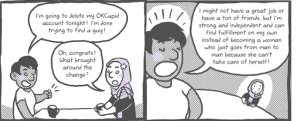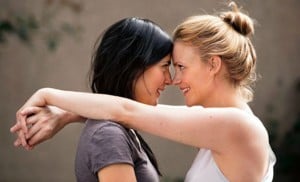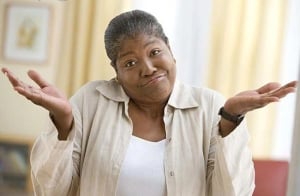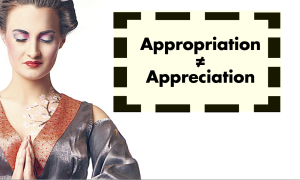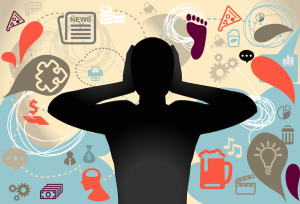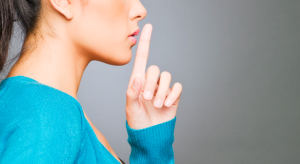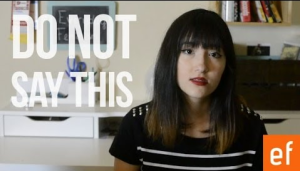Cristen: When white ladies like me get angry, it’s often dismissively blamed on our monthly menstrual. But imagine just how infuriating it would be if all of your negative emotions were blamed on your year-round skin tone.
News Anchor 1: I want to pick up on something that Jane said about the “angry black woman.” Who are the black women you see on the local news at night in cities all over the country? They’re usually angry about something.
Cristen: The stereotype of the “angry black woman” is a prime example of how these categorizations function as social control mechanisms.
You see, slavery, racism and pop culture have cooked up and perpetuated three primary typecasts for African American women: The mammy, the sapphire, and the jezebel.
Ingredients for Stereotyping Black Women
1. Slavery
2. Racism
3. Pop Culture
Cristen: On one end of the racist spectrum is the Mammy, who emerged as a desexualized, often overweight, caregiver to white slave-owning families. A role misconceived as compassionate compensation for the lack of her own personal and familial autonomy.
Actress 1: ‘Bout time one of you lugheads said it.
Cristen: On the other end is the hyper-sexualized and often lighter-skinned Jezebel, portrayed as an irresistible temptress in order to justify the systematic rape and impregnation of enslaved women.
Then smack dab in the middle is the Sapphire. AKA the angry black woman stereotype. A slightly newer invention than the mammy and the jezebel, the Sapphire functions to simultaneously marginalize black women’s intelligence and respectability – while also channeling through her racialized fear and disdain of black men.
Ever since her stage debut in early 19th century minstrel shows where she was performed by white dudes in blackface, the Sapphire has been played up for laughs as a less civilized contrast to proper white ladies. Sapphire’s namesake emerged quite a bit later on America’s favorite radio show “Amos n Andy,” which aired from 1928 to 1960.
And the show’s delightful comedic premise that white audiences loved to tune into? Mocking the hijinks and dialect of its black characters. Including Sapphire, the hot-tempered and constantly berating wife of the bumbling George “Kingfish” Stephens.
Even though the NAACP and Civil Rights activists were instrumental in getting the televised version of “Amos n Andy” finally pulled from syndication in 1966, Sapphire has been alive and not so well on screen ever since, with the brunt of her almost surrealist aggression usually targeted to black male characters.
There’s Aunt Ester in “Sandford and Sons” –
Actress 2: You just keep sucking on that sucker, sucker!
Cristen: Wilona Woods in “Good Times,” housekeeper Florence Johnson in “The Jeffersons.”
Actress 3: Mercy me, I done made you mad!
Cristen: Pam on “Martin,” Rochelle in “Everybody Hates Chris,” Teri in “Barbershop,” “Rasputia in “Norbit,” Angela in “Why Did I Get Married?” Not to mention pretty much all of Tyler Perry’s Madea empire. Entire reality shows sometimes revolve around this trope, such as “Real Housewives of Atlanta,” “Love and Hip Hop,” and the “Bad Girls Club.”
Laverne Cox told Buzzfeed that when she was a long time ago contestant on “I Want to Work for P. Diddy,” she had to actively resist producers pressures for her to play up being an angry black woman on-screen.
Actress 3: You and me are going to make a great team!
Actress 4: Oh, you looking for a sassy black friend?
Cristen: Now of course this longstanding and infuriating stereotype doesn’t just live on-screen. A 2015 Essence survey found that 70% of the African American women they talked to said that they feared their co-workers perceiving them as angry black women. And instead try to mold their personality to come across as acculturated girl next door.
But this stereotype can’t just be out-achieved. Case in point, New York Times television critic Alexandra Stanley collapsing Shonda Rhimes as well as her complex characters of Grey’s Anatomy‘s Dr. Miranda Bailey, How to Get Away With Murder‘s Analise Keating, and Scandal‘s Olivia Pope into angry black women largely based on them being black women.
Even being First Lady doesn’t stop it.
Michelle Obama: As potentially the first African American First Lady, I was also the focus of another set of questions and speculations. Conversations sometimes rooted in the fears and misperceptions of others. Was I too loud, or too angry, or too emasculating?
Cristen: And simply replacing angry with strong isn’t helping matters either.
Actress 5: Child, please. You speak the truth!
Cristen: Which is something that professor and MSNBC host Melissa Harris-Perry describes as a “derogatory ideal” that props up this myth of the strong black woman who simply doesn’t need any resources or support because she can manage on her own – hence, no need for us to fix anything.
Just in case it wasn’t clear enough that the angry black woman is a racist pop-cultural concoction, there’s even empirical data to mythbust it!
A 2009 study found that not only did African American women report significantly less frequent angry reactions in the face of perceived disrespect, negative evaluations, and criticisms, younger women in particular suppress rather than express intense angry.
Anger. Intense anger.
When it comes to what we should do about this angry black woman stereotype, I think Angela Basset’s got the right idea.
…Oh, shit!







